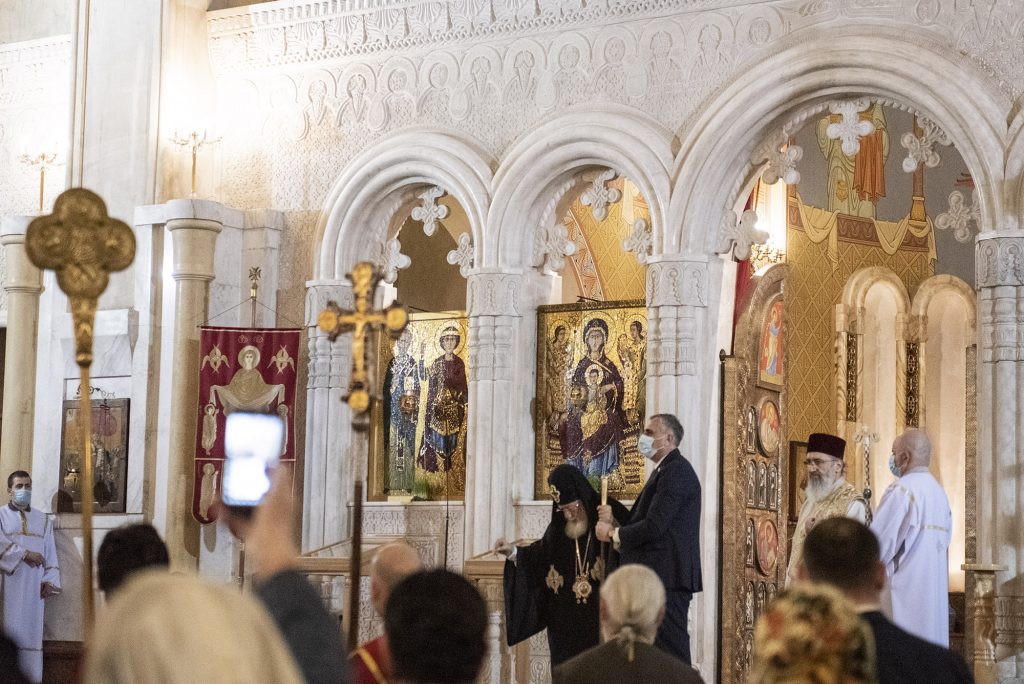Only 4% of Orthodox Christians in Georgia reported that they attended Easter liturgy this year, down from 44% who said they attended last year, new polling from CRRC Georgia shows.
The polling, released on Thursday, also found that Orthodox Christians did not approve of the Georgian Orthodox Church’s policy of continuing to use a single, shared spoon to give communion to worshippers despite the COVID-19 pandemic.
According to the survey, 33% of Orthodox Christians approved of the Church’s communal spoon policy, 43% disapproved, and 21% said they were uncertain.
People over the age of 54 were more disapproving of the policy, with 51% saying they disapproved than younger people, 39% of whom disapproved.
The findings are part of a wide-ranging survey conducted by CRRC Georgia and funded by the Dutch Embassy in Georgia on public opinion during the coronavirus crisis.
Over 6,200 people were surveyed in six waves between 29 April and 6 June. The reported margin of error for each wave was around 3%.
Other findings included widespread support for the government’s response to the virus, with most of the individual anti-coronavirus measures assessed positively.
Despite approving of the measures taken, a majority of respondents still reported favouring opening the economy over ensuring the virus was under control.
The survey found that half of employed Georgians lost a job during the pandemic, with half of those regaining employment by the beginning of June.
Nine-percent of respondents said they believed 5G infrastructure was connected to the spread of the virus.
The study also recorded a large boost to the perceived performance of most Georgian institutions.
The prime minister, president, and parliament, all saw their approval ratings tripling compared to CRRC’s previous polling on public attitudes in Georgia, in November–December 2019.
Prime Minister Giorgi Gakharia saw his approval rating jump from just 21% to 63%, President Salome Zurabishvili from 9% to 25%, and parliament from 9% to 32%.
Despite disapproval of the Church’s policy on communion, the Georgian Orthodox Church also saw their approval rating increasing from 50% before the crisis to 66% in the latest survey wave.
The study’s authors noted, however, that the rise in approval for the Church was less than that of other institutions. ‘Its performance is no longer higher than every other institution in the country. In the last survey conducted in this study, the Church’s approval rating was sixth out of nine institutions asked about,’ they said.
A controversial spoon
The Georgian Orthodox Church’s refusal to change the Holy Communion ceremony during the pandemic received widespread criticism, especially in the run-up to Easter.
[Read By Vera Gogokhia: Opinion | The conflict between Church and state during a pandemic endangers us all]
The ceremony involves worshipers consuming bread soaked in wine, which according to Church doctrine is the body and blood of Jesus Christ, from a common chalice and with a common spoon.

Health authorities warned that the ritual could be a vector for COVID-19 transmission.
As Easter approached and as lockdown measures tightened, officials repeatedly urged the public not to attend church services.
‘As a Christian, I'll be following [Easter services] on TV, at home’, Georgian Prime Minister Giorgi Gakharia said on 4 April.
‘Let’s pray at home for each other and for our country’, Paata Imnadze, Deputy Director of Georgia’s National Centre for Disease Control said on 6 April.
Despite a ban on gatherings of more than three people, however, churches throughout the country remained mostly unaffected by the restrictions.




 23 July 2020
23 July 2020



